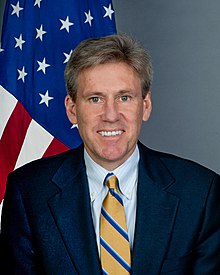J. Christopher Stevens: Difference between revisions
<ref name=statedeptbio/> |
title of film |
||
| Line 1: | Line 1: | ||
{{Citations missing}} |
{{Citations missing}} |
||
[[File:Ambassador christopher stevens.jpg|thumb|John Christopher Stevens]] |
[[File:Ambassador christopher stevens.jpg|thumb|John Christopher Stevens]] |
||
'''John Christopher Stevens''' was the [[United States Ambassador to Libya|U.S. Ambassador to]] [[Libya]].<ref name=statedeptbio>{{cite web|url=http://www.state.gov/r/pa/ei/biog/193075.htm|title=Stevens, J. Christopher|publisher=U.S. Department of State|accessdate=2012-09-12}}</ref> He was killed in an [[September 11 2012 U.S. diplomatic missions attacks|attack on the U.S. consulate]] while he was visiting [[Benghazi]] on September 11 2012.<ref>{{cite web|url=http://www.bbc.co.uk/news/world-africa-19570254|title=US ambassador 'killed in Libya'|publisher=BBC News|date=2012-09-12|accessdate=2012-09-12}}</ref> |
'''John Christopher Stevens''' was the [[United States Ambassador to Libya|U.S. Ambassador to]] [[Libya]].<ref name=statedeptbio>{{cite web|url=http://www.state.gov/r/pa/ei/biog/193075.htm|title=Stevens, J. Christopher|publisher=U.S. Department of State|accessdate=2012-09-12}}</ref> He was killed in an [[September 11 2012 U.S. diplomatic missions attacks|attack on the U.S. consulate]] while he was visiting [[Benghazi]] on September 11 2012, reportedly by protesters enraged over the film [[Innocence of Muslims]].<ref>{{cite web|url=http://www.bbc.co.uk/news/world-africa-19570254|title=US ambassador 'killed in Libya'|publisher=BBC News|date=2012-09-12|accessdate=2012-09-12}}</ref> |
||
He arrived in Tripoli in May 2012 as U.S. Ambassador to Libya. He served twice previously in Libya, as Special Representative to the [[National Transitional Council]] from March 2011 to November 2011 during the [[Libyan civil war|Libyan revolution]] and as the Deputy Chief of Mission from 2007 to 2009.<ref name=statedeptbio/> |
He arrived in Tripoli in May 2012 as U.S. Ambassador to Libya. He served twice previously in Libya, as Special Representative to the [[National Transitional Council]] from March 2011 to November 2011 during the [[Libyan civil war|Libyan revolution]] and as the Deputy Chief of Mission from 2007 to 2009.<ref name=statedeptbio/> |
||
Revision as of 10:44, 12 September 2012
This article needs additional citations for verification. |

John Christopher Stevens was the U.S. Ambassador to Libya.[1] He was killed in an attack on the U.S. consulate while he was visiting Benghazi on September 11 2012, reportedly by protesters enraged over the film Innocence of Muslims.[2]
He arrived in Tripoli in May 2012 as U.S. Ambassador to Libya. He served twice previously in Libya, as Special Representative to the National Transitional Council from March 2011 to November 2011 during the Libyan revolution and as the Deputy Chief of Mission from 2007 to 2009.[1]
His previous overseas assignments included: Deputy Principal officer and Political Section Chief in Jerusalem; political officer in Damascus; consular/political officer in Cairo; and consular/economic officer in Riyadh. In Washington, Ambassador Stevens served as Director of the Office of Multilateral Nuclear and Security Affairs; Pearson Fellow with the Senate Foreign Relations Committee; special assistant to the Under Secretary for Political Affairs; Iran desk officer; and staff assistant in the Bureau of Near Eastern Affairs.[1]
Prior to joining the Foreign Service in 1991, he was an international trade lawyer in Washington, DC. From 1983 to 1985 he taught English as a Peace Corps volunteer in Morocco.[1]
He was born and raised in northern California. He earned his undergraduate degree at the University of California at Berkeley in 1982, a J.D. from the University of California’s Hastings College of Law in 1989, and an M.S. from the National War College in 2010. He spoke Arabic and French.[1]
References
- ^ a b c d e "Stevens, J. Christopher". U.S. Department of State. Retrieved 2012-09-12.
- ^ "US ambassador 'killed in Libya'". BBC News. 2012-09-12. Retrieved 2012-09-12.
